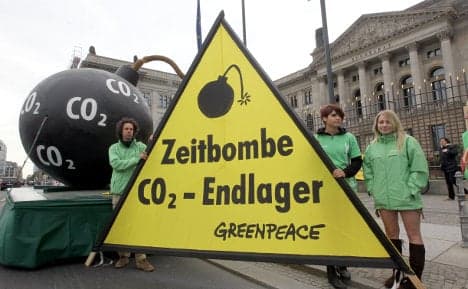Germany rejects carbon dioxide storage plans

Germany’s upper house of parliament, the Bundesrat, has knocked down a proposal to start storing the greenhouse gas carbon dioxide underground in a bid to reduce emissions.
The rejection of the draft law for using carbon capture and storage methods will be a blow to Angela Merkel’s government which was hoping to use the technology of compressing carbon dioxide in underground storage facilities.
The compression is undertaken as the carbon dioxide is generated, largely in conventional fossil fuel power stations, requiring new technologies. The gas is then pressurised to turn it into a liquid, and stored underground.
Tests on the methods to do this were slated to be undertaken by 2017, after which two or three storage facilities were planned for construction in northern and eastern regions of the country.
Opposition in those areas was strong, based on fears of possible explosion-like uncontrolled emissions of the gas.
“We don’t want it in Schleswig-Holstein,” said state premier Peter Harry Carstensen.
It is now possible that the €1.5-billion demonstration power station due to be built in Jänschwalde, Brandenburg by power generator Vattenfall could be jeopardised.
The Bundesrat vote was accompanied by demonstrations for and against, with Greenpeace building a large mock carbon dioxide time-bomb outside to warn against the incalculable risks of, for example, ground water contamination.
Environmental protester Claude Wegner said she was against the idea of such a storage place being built in Oderbruch, Brandenburg. She said pressurised carbon dioxide storage underground was like nuclear power in that it was, “uncontrollable and not possible to secure.”
On the other side of the argument, trade unions representing workers at fossil fuel power stations, were in Berlin to show their support for the idea. “In Norway it has been tested for a long time without any problems,” said Benjamin Maeschke, an apprentice at the Vattenfall power station in Schwarze Pumpe.
One particularly controversial clause in the draft law which caused argument in the Bundesrat enabled individual states to prevent carbon dioxide storage facilities being built in their regions under certain limited circumstances. This was opposed by representatives from Brandenburg in particular, who argued it would allow some states to duck their responsibilities.
“Germany is one of the leaders in CCS technology,” said Brandenburg’s state Economy Minister Ralf Christoffers. “We therefore need a federal-wide unitary solution.” He said it was not only about emissions from fossil fuel power stations, but also concerned the 400 million tons of carbon dioxide emitted by industry each year.
DPA/The Local/hc
Comments
See Also
The rejection of the draft law for using carbon capture and storage methods will be a blow to Angela Merkel’s government which was hoping to use the technology of compressing carbon dioxide in underground storage facilities.
The compression is undertaken as the carbon dioxide is generated, largely in conventional fossil fuel power stations, requiring new technologies. The gas is then pressurised to turn it into a liquid, and stored underground.
Tests on the methods to do this were slated to be undertaken by 2017, after which two or three storage facilities were planned for construction in northern and eastern regions of the country.
Opposition in those areas was strong, based on fears of possible explosion-like uncontrolled emissions of the gas.
“We don’t want it in Schleswig-Holstein,” said state premier Peter Harry Carstensen.
It is now possible that the €1.5-billion demonstration power station due to be built in Jänschwalde, Brandenburg by power generator Vattenfall could be jeopardised.
The Bundesrat vote was accompanied by demonstrations for and against, with Greenpeace building a large mock carbon dioxide time-bomb outside to warn against the incalculable risks of, for example, ground water contamination.
Environmental protester Claude Wegner said she was against the idea of such a storage place being built in Oderbruch, Brandenburg. She said pressurised carbon dioxide storage underground was like nuclear power in that it was, “uncontrollable and not possible to secure.”
On the other side of the argument, trade unions representing workers at fossil fuel power stations, were in Berlin to show their support for the idea. “In Norway it has been tested for a long time without any problems,” said Benjamin Maeschke, an apprentice at the Vattenfall power station in Schwarze Pumpe.
One particularly controversial clause in the draft law which caused argument in the Bundesrat enabled individual states to prevent carbon dioxide storage facilities being built in their regions under certain limited circumstances. This was opposed by representatives from Brandenburg in particular, who argued it would allow some states to duck their responsibilities.
“Germany is one of the leaders in CCS technology,” said Brandenburg’s state Economy Minister Ralf Christoffers. “We therefore need a federal-wide unitary solution.” He said it was not only about emissions from fossil fuel power stations, but also concerned the 400 million tons of carbon dioxide emitted by industry each year.
DPA/The Local/hc
Join the conversation in our comments section below. Share your own views and experience and if you have a question or suggestion for our journalists then email us at [email protected].
Please keep comments civil, constructive and on topic – and make sure to read our terms of use before getting involved.
Please log in here to leave a comment.